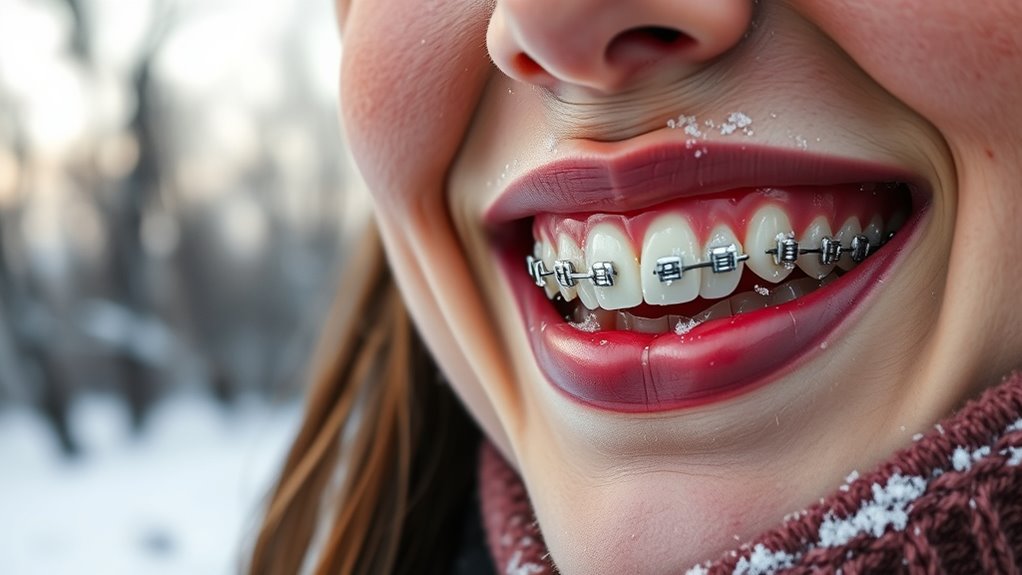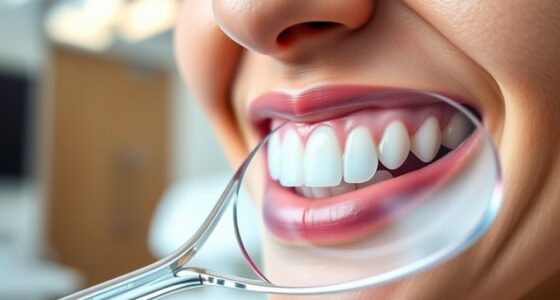Cold weather can make your braces more challenging by increasing tooth sensitivity and causing discomfort from dry air and indoor heating. Winter clothing like scarves and hats might accidentally bump or loosen brackets if you’re not careful. Hot drinks and hard winter foods can also pose risks, so it’s important to stay cautious. Staying hydrated and protecting your lips helps keep your oral health in check. Keep going to discover more tips to stay comfortable and maintain your braces during winter.
Key Takeaways
- Cold temperatures can cause tooth sensitivity, making eating and drinking more uncomfortable for braces wearers.
- Cold weather increases the risk of brackets loosening or wires bending due to handling winter clothing or hot beverages.
- Indoor heating can dry oral tissues, leading to chapped lips, irritation, and increased plaque buildup around braces.
- Consuming hot or hard winter foods and drinks may temporarily expand braces components or damage wires if not consumed cautiously.
- Proper hydration and using lip balm help prevent dryness and irritation, maintaining comfort and oral health during cold months.

Cold weather can pose unique challenges for those with braces, affecting both comfort and orthodontic care routines. As temperatures drop, you might notice increased discomfort or sensitivity, especially when trying to stay warm. Wearing winter gear such as scarves, hats, and gloves is essential, but it can also lead to accidental contact with your braces or brackets. When you pull a scarf over your head or adjust a hat, you might bump your braces or cause a bracket to loosen. To avoid this, be mindful when putting on winter wear, and consider using softer fabrics that won’t catch on your wires or brackets.
Tooth sensitivity tends to heighten in cold weather, especially if you already experience some discomfort from braces. The cold air can chill exposed teeth, making eating or drinking chilly beverages uncomfortable. If you notice increased sensitivity, try to avoid extremely cold or hot foods and drinks. Using a toothpaste formulated for sensitive teeth can help reduce discomfort, and rinsing with warm water after meals can soothe your teeth. Maintaining good oral hygiene is essential, especially in winter, when dehydration from indoor heating can dry out your mouth, reducing saliva flow that naturally protects your teeth and braces.
Winter wear also requires extra care around your braces. For instance, when you’re dressed warmly, you may be tempted to eat comfort foods or hot beverages. Just remember that sugary or sticky foods can increase the risk of plaque buildup and cavities, which can be harder to manage during winter months. Also, hot drinks like tea or coffee, while comforting, can sometimes cause temporary expansion of the metal in braces, leading to minor discomfort or loosened brackets. Always rinse your mouth with water after consuming hot beverages, and avoid biting into very hard or chewy winter treats that might damage your braces.
In addition, cold weather tends to make your lips and mouth more prone to cracking or chapping, which can lead to irritation around your braces. Using a lip balm regularly can help prevent dryness, and staying well-hydrated by drinking plenty of water supports overall oral health. Moreover, heat pump technology can influence indoor climate control, impacting oral comfort during winter. If you find that the cold weather increases your tooth sensitivity or causes discomfort, consult your orthodontist. They may recommend adjustments or specific care routines to keep your treatment on track and your mouth comfortable.
Frequently Asked Questions
Can Cold Weather Cause Braces to Become Loose or Break?
Cold weather alone typically doesn’t cause your braces to become loose or break. However, it can lead to brace damage if you experience cold-related discomfort and ignore it, risking accidental damage while eating or drinking. You might also feel more sensitive or discomfort, which can make you more prone to mishandling your braces. Always check your braces regularly and visit your orthodontist if you notice any issues, especially during colder months.
Does Winter Weather Affect the Effectiveness of Orthodontic Treatments?
Winter weather doesn’t directly affect your orthodontic treatment efficacy, but it can influence your experience. Cold temperatures might cause minor discomfort or increase the likelihood of dry mouth, which can impact oral hygiene. Weather impact on treatment is minimal if you maintain regular appointments and proper care. Stay vigilant by avoiding icy surfaces and sticking to your orthodontist’s advice, ensuring your treatment stays on track despite the season.
Are There Specific Oral Hygiene Tips for Braces During Cold Months?
An ounce of prevention is worth a pound of cure. During cold months, prioritize your oral hygiene by using a fluoride rinse to combat winter whitening and ice-induced sensitivity. Brush gently after every meal to prevent plaque buildup, and avoid extremely cold foods or drinks that can trigger sensitivity. Regular flossing and visits to your orthodontist also help keep your braces clean and comfortable, ensuring your treatment stays on track all winter long.
How Should I Adjust My Orthodontic Care Routine in Cold Climates?
During cold months, you should prioritize winter oral health by maintaining consistent braces maintenance and brushing carefully to prevent dryness and discomfort. Drink plenty of water to stay hydrated, as cold weather can dry out your mouth, increasing the risk of plaque buildup. Avoid overly hot or cold foods, and wear a mouthguard if you participate in winter sports. These steps help keep your orthodontic treatment effective and comfortable year-round.
Does Cold Weather Increase the Risk of Orthodontic-Related Dental Issues?
Cold weather can slightly increase your risk of orthodontic-related dental issues due to seasonal sensitivity. Indoor heating may dry out your mouth, leading to discomfort or increased risk of cavities. You should be extra attentive to oral hygiene, avoid overly hot drinks, and stay well-hydrated. Regular visits to your orthodontist help address any emerging issues early, ensuring your braces stay effective and your teeth stay healthy during colder months.
Conclusion
As winter’s chill settles in, remember your braces are like delicate seeds waiting to bloom. Cold weather can challenge your orthodontic journey, but with care, patience, and attention, you nurture progress. Embrace the season as a reminder that even in the cold, growth is possible—your smile’s transformation is the warmth that keeps you moving forward. Stay vigilant, and let the frost symbolize your resilience in achieving the beautiful smile you deserve.









